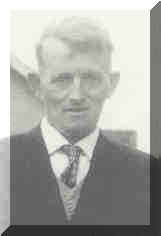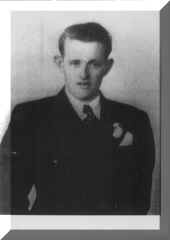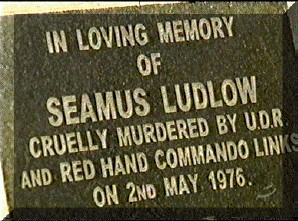The Murder of Seamus Ludlow in County Louth, May 1976. Towards a public inquiry?



The Murder of Seamus Ludlow in County Louth, May 1976. Towards a public inquiry?
|
|
Introduction to the murder of Seamus Ludlow and the official cover-up. Michael Cunningham investigation - 1978 The recent Campaign for Truth and Justice. Irish Victims Commission Report. Ludlow family's questions for the RUC (now the PSNI) Jim J. Kane's letter to the N I Human Rights Commission. Jim J. Kane's letter to the RUC Ludlow Family Letter to Bertie Ahern View messages from our original Guestbook Other Ludlow Family Sites.
|
The Sunday World, 15 February 2004: Killed and Forgotten How an innocent hero was killed by loyalist murder squad
By Eamon Dillon The murder of farm labourer Christy Phelan serves as a brutal reminder how cross-border loyalist murder gangs were never brought to book for their crimes south of the border. In a county where three decades of violence in Northern Ireland was a distant conflict, his unsolved and forgotten killing near Sallins, Kildare, in June 1975 was a rarity. However, just as the killers who planted bombs in Dublin and Monaghan the same year, the men who took Phelan's life have also escaped justice. Conflict The report by the Republic's Judge Barron last month highlighted how murder gangs at work in the south during the height of the conflict got away scot-free. The retired judge also investigated the killing of Christy Phelan along with that of forestry worker Seamus Ludlow near Dundalk. However, neither murder was included in his report which dealt only with the Dublin and Monaghan bombings, which left 33 people dead. Christy Phelan, a 48-year-old farm worker, was murdered as he enjoyed his usual Sunday stroll after he stumbled across terrorists trying to derail a train full of republican supporters. A father of five, Christy was dragged down a railway embankment, throttled with his tie and stabbed in a savage and murderous attack. A bomb planted onto the track blew up a section of track and left a two-foot crater. Luckily the target, a train carrying 250 Official IRA supporters to a commemoration at Bodenstown, passed the spot before the bomb exploded. A shocked CIE supervisor who walked the line after hearing the explosion found Phelan's battered, lifeless body. The specialist skills shown by the bombers in placing the charges suggest it was carried out by someone with military training. At the time it was thought the killing and bombing was the work of the Provisional IRA or the INLA, who were then locked in a bloody feud with the Officials. However, the murder weapon found a short distance from the scene gave up a fingerprint. It is claimed that it belonged to a known loyalist, later blown up by his own bomb during an attack in Northern Ireland. By the standards of violence in Northern Ireland at the time, Christy Phelan's death was hardly shocking, but in the Republic it was headline news. He had worked at the nearby Sherlockstown Farm and had been to 9.30am Mass in Ardclough Church. After returning home he left his bicycle to take his weekly stroll along the Strafing to Kill road - a typical Kildare landscape of quiet farmland and stud farms. Beaten It is thought he paused on the railway bridge at Barograph close to his home to look down the track. His shock and terror as he was pulled from the bridge parapet down the embankment can only be imagined. The marks on his body - he had been badly beaten and his knuckles were torn and bleeding - suggest Phelan made a desperate fight for life before a bayonet was used to stab him through the heart. The fearsome double-edged knife with a 9.5 inch blade had been honed to a razor-sharp point and was later discovered in a ditch over a mile from the scene. During the course of their investigation, the gardai interviewed 1,100 people, but the killers were never found. At his funeral, the then parish priest John McDonald told mourners that the passengers on board the train owed their lives to Christy Phelan.
See also: Justice for the Forgotten at http://www.dublinmonaghanbombings.org/. The Barron Report on the May 1974 Dublin and Monaghan bombings can be downloaded in pdf format from http://www.irlgov.ie/oireachtas/Committees-29th-D%E1il/jcjedwr-debates/InterimDubMon.pdf Ireland on Sunday, 12 October 2003: Top names linked to Dublin-Monaghan atrocity Bombs report names gardai 'collaborators' The Sunday Independent, 2 November 3003: Net is closing in on Dublin car bombers The Dundalk Democrat, 8 November 2003: Dundalk bombing and Ludlow murder ignored The Dundalk Democrat, 8 November 2003: Family feel inquiry will make little difference The Dundalk Democrat, 8 November 2003: Inquest could be next January The Irish News, 8 November 2003: No mention of Dundalk victims in Barron report The Irish News, 11 November 2003: Interview loyalist over witness claim judge told The Dundalk Democrat, Editorial, 20 December 2003: No cause for optimism following Barron Report The Dundalk Democrat, 20 December 2003: Missing files a matter of concern for Ludlow relatives The Dundalk Democrat, 20 December 2003: Bombing families fear truth will never be known The Irish Daily Star (Northern Edition), 29 January 2004: Family and former British army man hit out Barron "Failed to Serve Truth" Former spy slams report The Irish Daily Star (Northern Edition), 29 January 2004: Family wants truth about murder The Sunday Mercury, (English Midlands newspaper) 8 February 2004: Midland man may face 1976 murder quiz The Irish Daily Star (Northern Edition), 9 February 2003: 'Shine light on Ludlow files' Family calls for answer Exclusive I Homepage I I Top
I I Press Coverage I I Barron
Inquiry I I Terms of reference for Barron
Inquiry I I Fresh Inquest I I Celtic
League Support I I New
GuestMap Guest Book.
I
Copyright © 2004 the Ludlow family. All rights reserved. Revised: February 17, 2004 .
|